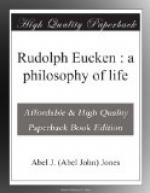The knowledge that is possible to the empiricist, then, is merely that which is derived from direct experience, and simple summations or generalisations into a single assertion of a number of similar assertions, all of which were individually derived from experience. This is the position scientists as such, and believers in the theory of naturalism, take up as to the possibility of the knowledge of truth to the human mind. They are entirely consistent, therefore, when they arrive ultimately at the agnostic position, and contend that our knowledge must necessarily be confined to the world of experience, and that nothing can be known of the world beyond. But they are fundamentally wrong in overestimating the place of the sense organs, and forgetting that while these have a part to play in life, they do not constitute the whole of life.
A far more satisfactory theory is that of Rationalism. It is a theory that admits that the human mind has some capacity for working upon the data presented to it by the sense organs. Man is no longer quite so helpless a creature as empiricism would make him. He is able to weigh and consider the facts that are presented to the mind. The method rationalism uses to arrive at truth is that of logical deduction, and the test of truth is that the steps in the process are logically sound. We may start from the data “All dogs are animals” and “Carlo is a dog,” and arrive very simply at the conclusion “Carlo is an animal.” The conclusion is correct because we have reasoned in accordance with the laws of logic, with the laws of valid thought. All logical reasoning is, of course, not so simple as the example given, but it may be stated generally that when there is no logical fallacy, a correct conclusion may be arrived at, provided, too—and herein lies the difficulty—provided that the premises are also true. These premises may be in themselves general statements—how is their truth established? They may be, and often are, the generalisations of the empirical sciences, and must then possess the same degree of uncertainty that these generalisations possess. Some philosophers have contended that certain general ideas are innate, but few would be found nowadays to accept such a contention. At other times mere definitions of terms may serve as premises. One might state as a premise the definition “A straight line is the shortest distance between two points,” and the further statement that




